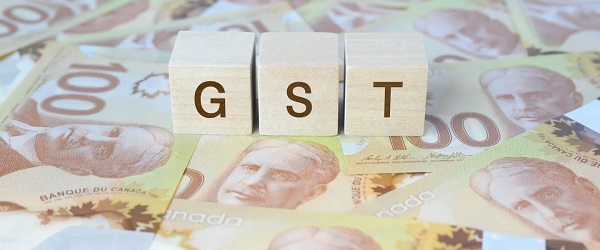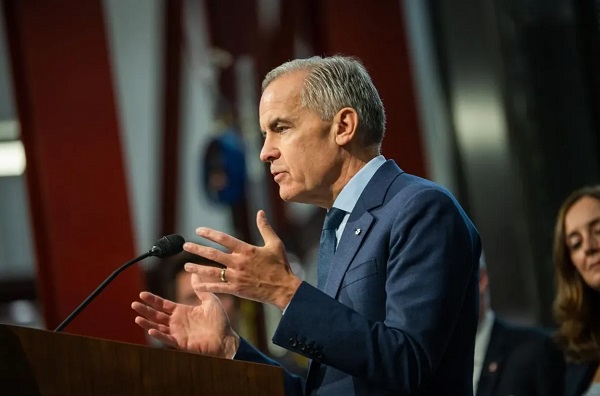Business
Ottawa’s GST break and rebate cheques amount to bad policy

From the Fraser Institute
By Jake Fuss and Grady Munro
On Thursday, the House of Commons passed legislation (tabled by the Trudeau government) that would temporarily suspend the federal Goods and Services Tax (GST) on select items from December 14 to February 15 at an estimated cost of $1.6 billion, as part of the government’s “more money in your pocket” plan. The legislation now goes to the Senate for approval.
The government has delayed a separate proposal—to give Canadians $250 rebate cheques—in light of NDP demands to expand eligibility to include seniors. The original proposal would have sent cheques to an estimated 18.7 million Canadians (who worked in 2023 and earned $150,000 or less) at a cost of $4.7 billion. While aimed at all Canadians, this proposal is eerily similar to the recent move by Ontario’s Ford government, which plans to send $200 cheques to Ontarians. And again, it’s just bad policy.
Why?
Consider this. During the recent discussion about increasing Old Age Security payments by 10 per cent for seniors aged 65 to 74, former Bank of Canada governor David Dodge said, “The last thing that we need to be spending money on at this point in time is boosting consumption for relatively well-off people.” This critique also applies to the Trudeau government’s $250 rebate cheques, which would go to many well-off Canadians. Indeed, based on the government’s original proposal, a couple earning a combined household income of up to $300,000 could receive these cheques.
Moreover, because onetime payouts and temporary tax breaks don’t incentivize people to work and invest, they don’t help raise living standards. But permanent tax cuts, such as reducing personal income tax rates or lowering capital gains taxes, would provide a stronger incentive for Canadians to work more and make investments because they get to keep more of the money they earn. That would help drive economic growth, create jobs and provide more economic opportunities for workers across the income spectrum.
In fact, the Trudeau government’s plan may actually hurt economic growth in the long run. The government is expected to run budget deficits for the foreseeable future, and will likely borrow the billions needed to pay for the GST break and $250 cheques. In other words, this “relief” package will likely increase the federal deficit in 2024 and potentially 2025. By borrowing more money, the government will increase the tax burden on future generations of Canadians who ultimately must pay off today’s debt. And just as lower taxes improve economic incentives, this higher future tax burden will worsen incentives and likely stifle economic growth and reduce living standards.
Don’t be deceived. While it’s nice to get a cheque in the mail and have a couple months free of the GST for some items, the Trudeau government’s “more money in your pocket” plan is bad policy.
Business
Ottawa Bought Jobs That Disappeared: Paying for Trudeau’s EV Gamble

The jobs promised by the thousands never arrived. The debacle of Trudeau’s gamble in the EV sector offers a dire warning about Carney’s plans to “invest” in the economy of the future.
Every age invents new names for old mistakes. Ours calls them investments. Before the Carney government reluctantly unveils its November budget and promises another future paid for in advance, Canadians should remember Ingersoll, one of the last places their leaders tried to buy tomorrow.
In December 2022, Prime Minister Justin Trudeau told Canadians that government backing would help General Motors turn its Ingersoll plant into a beacon of green industry [See image above]. “We made investments to help GM retool this plant,” he wrote online, “and by 2025 it will be producing fifty thousand electric vehicles per year.” [That would mean 137 vehicles each day, or about six vehicles every hour]. It sounded like renewal. Supposedly, this was how the innumerate prime minister was building the economy of the future. In truth, it became an expensive demonstration of how progressive governments love to peddle rampant spending for sound strategy (1)(2).
On the whole, the Trudeau government boasted of having pledged over $50 billion in subsidies to various companies in the EV sector, some of which are failing and most of which are scaling down and exporting production capability to the US. The much-promised benefits have not materialized (3).
The specific Ingersoll plan began with 259 million dollars from Ottawa through the Strategic Innovation Fund and the Net Zero Accelerator. Ontario matched it with another 259 million. The half-billion-plus subsidy financed the plant’s switch from gasoline-powered Equinox production to BrightDrop electric delivery vans. Added to that were the usual incentives: research credits, accelerated write-downs, and energy subsidies. The promise was the mythical creation of thousands of “good middle-class jobs” (4)(5).
At the time, the CAMI Assembly plant employed about two thousand workers. When it closed for retooling in 2022, employment fell to almost none. The reopening in 2023 restored roughly 1,600 across two shifts. A year later, as orders slowed, one shift was cut and employment fell to about 1,300. By early 2025, layoffs cut the number to around eight hundred, and by October that year, when GM confirmed the end of BrightDrop production, fewer than seven hundred remained. The workforce had collapsed by nearly two-thirds from its pre-electric-vehicle conversion level. In statistical terms, two of the three employees the PM used for the photo-op in Ingersoll three years ago are unemployed today. That’s some economic performance.
The numbers expose the illusion. With 518 million dollars in public funds and only about 3,500 vans built in 2024, taxpayers paid about 148 thousand dollars for each vehicle GM produced. Counting only the federal contribution still yields $74,000 per van. Divided by the remaining jobs, the subsidy works out to more than half a million dollars per worker. The arithmetic refutes the fantasy of Prime Minister Trudeau’s speeches (10).
We are in 2025. Today is the future the Liberals promised the country. Neither Ottawa nor Queen’s Park will dwell on the above-stated facts today. When Crown Royal closed a plant in 2024, Premier Ford posed before the cameras and dumped a bottle of whisky to protest lost jobs. Now that a multinational massively subsidized by his own government has cut its workforce in Ingersoll by two-thirds, he will not torch a van or denounce General Motors from the front steps of Queen’s Park. It is easier to rage at private enterprise than to admit one’s own complicity (11).
The failure in Ingersoll was entirely predictable. Government enthusiasm outran commercial sense. The BrightDrop vans entered a market already filled by cheaper competitors in the United States and Asia. Demand never met expectation. Parking lots filled with unsold inventory. A company that lives by numbers did the rational thing: it slowed production, cut staff, and left. The Canadian taxpayer, bound by law and habit, stays behind to pay the bill (12).
The story reveals the weakness of Canada’s industrial policy and the ignorance of its political class. Instead of creating conditions for enterprise, such as reliable energy, stable regulation, and moderate taxes, progressive governments spend on applause. They judge success by the number of jobs announced, yet those very jobs vanish once the cameras go home. When the invoices arrive, they are paid by citizens, not by those who made the promises.
Subsidy breeds its own demand. Once one firm is rewarded, others line up to ask for the same. Lobbying replaces competition. Politicians, afraid to seem heartless, keep writing cheques. Each new administration claims to be more strategic than the last, yet the pattern persists. Canada announces, subsidizes, and retreats. No country ever bought its way into competitiveness, and none ever will.
Trudeau once said his government had “bet big on electric vehicles.” Betting big with other people’s money is not vision but gambling. The wager was not on technology or productivity but on narrative, on the naive idea that a moral intention [to save the planet] could replace market reality. The result was fewer jobs, a product the market did not want, and a claim of success that no longer convinced anyone. But Ontarians gave him their vote for it (1).
Premier Ford deserves no exemption. He campaigned on fiscal restraint and common sense, then followed Ottawa’s lead as if confused by his own rhetoric. His government’s matching subsidy gave the federal scheme the appearance of consensus; he legitimized the scheme. When it failed, he shared the liability and the silence. To underwrite failure once is an error; that they keep repeating it for political cover while the public supports them is folly (11).
Industrial policy in a free society should respect the limits of government competence and resist the fantasy of juvenile ideology. The state can uphold contract law and ensure that citizens have the skills to compete. It has a mixed record in building infrastructure. It cannot direct markets better than those who live or die by them. When it tries, it presents the size of a grant for the value of a result. Governments announce job numbers because they are visible. Productivity and value creation are not. Yet it is productivity that sustains work and dignity, not the temporary employment that disappears when the subsidy runs out or when the companies betray the deal.
The Ingersoll experiment also exposes a moral weakness that the public often falls for. Spending is treated as proof of caring. Subsidy is renamed investment (more on this coming soon). Failure is described as transition. When costs rise and goals vanish, the story is rewritten as a necessary learning curve. Yet nothing is learned, because the same people who lost public money yesterday are trusted with more tomorrow. That is not innovation but inertia.
A free economy does not need bribery to breathe. It requires the discipline of risk and the liberty to fail without dragging a country with it. Ingersoll was not undone by technology but by conceit. Prosperity cannot be decreed, and markets cannot be commanded into obedience.
That was Trudeau, the current PMO occupants will say. But Mark Carney has mastered the same rhetorical sleight that defined Trudeau’s industrial crusade. Spending becomes “investment,” and programs become “platforms.” Ahead of his first budget, he has declared that his government would “catalyze unprecedented investments in Canada over the next five years,” even as he announced departmental cuts and fiscal restraint. He will invest more and spend less, they say. The vocabulary of ambition disguises the contradiction. Billions for housing, energy, and “resilience” are presented not as costs but as commitments to a “higher” economic purpose. His plan for a new federal housing agency with thirteen billion dollars in start-up capital is billed as an investment in the future, though it is, in substance, immediate public spending under a moral banner (13)(14) they had dragged for years.
Carney’s speeches in Parliament and before cameras follow the same pattern of incantation. “We can build big. Build bold. Build now. Build one Canadian economy,” he told the House in June. In October, he promised that “the decades-long process of an ever-closer economic relationship between the Canadian and U.S. economies is over … we will invest in new infrastructure and industrial capacity to reduce our vulnerabilities.” The cadence of certainty masks the absence of limits, just like Justin’s promises. It’s hubris without ability. In their minds, announcing “investment” becomes a synonym for action itself, and ambition replaces accountability (15).
The structure of this rhetoric is identical to the Ingersoll fiasco. Then, as now, the government announced a future built on “investment,” fifty thousand vehicles a year, thousands of secure jobs, abundant prosperity and a greener tomorrow. Vast sums of money were spent supposedly to create that future before a single market test was conducted. Instead, the result was fewer jobs and no market at all.
Carney’s program of “building the future economy” repeats that template: promise vast returns from state-directed spending, redefine subsidy as vision, and rely on tomorrow to conceal today’s bill. The vocabulary of investment has become the language of evasion, reflecting its etymological origins in the Latin “investire,” which originally meant “to clothe.” In the way that politicians use it today, it is a return to its meaning of concealment. It has become a way to describe the use of public money without admitting the massive risk of loss.
As the Carney government prepares its first budget, Canadians should remember what happened when their leader last tried to buy a future with lavish “investment.” Another round of extravagant spending promises is already upon us: new partnerships, new funds with new names, new assurances that this time will be different.
But it will not be different. Judging by all the pre-budget warnings that “sacrifices will need to be made,” it will be worse. In that warning, Carney presupposes that the elderly who have been choosing between eating and heating their home, mothers standing in line at food banks, the record MAiD users, and the young people who have lost hope of emerging out of parental basements to dwellings they can own have all been lying on a bed of roses this last decade of Liberal rule.
The Ingersoll debacle, a foolishly ideological $500-million-plus gamble, is emblematic, of course. It is just the tip of the Liberals’ iceberg of waste. So when you hear Prime Minister Carney tell Canadians they must prepare to sacrifice, remember the long string of Ingersolls his party has gifted this country in recent years. The path of sacrifice the Liberals want now Canadians to walk is paved with the rubble of their own multibillion-dollar blunders.
Every age invents new names for old mistakes, almost as a way to excuse them, and then moves on, but ours invents new names and keeps making the same one over and over again. Entitled hubris knows no bounds.
The Liberal government is already messing up the economy of the present, and they badly botched the economy of the recent past. When using the same strategy clothed in varying language, the economy of the future will not fare better.
Haultain Research is a reader-supported publication.
To receive new posts and support our work, please consider becoming a free or paid subscriber.
Business
CBC uses tax dollars to hire more bureaucrats, fewer journalists

By Jen Hodgson
The Canadian Broadcasting Corporation is using taxpayer money to pad its bureaucracy, while reducing the number of journalists on staff, according to access-to-information records obtained by the Canadian Taxpayers Federation.
“CBC defends its very existence based on its journalism, but its number of journalists are going down while its bureaucracy keeps getting bigger and taxpayer costs keeps going up,” said Franco Terrazzano, CTF Federal Director. “Why does the government keep giving CBC more taxpayer money if barely anyone is watching and its number of journalists keeps going down?”
The CBC employed 745 staff with “journalist” or “reporter” in their job title in 2021. That number dropped to 649 by 2025, the records obtained by the CTF show. Of the 6,100 total employees disclosed by the records, just 11 per cent of CBC staff had “journalist” or “reporter” as their job title in 2025, according to the records.
Even journalist roles such as editors, producers and hosts declined between 2021 and 2025.
While the number of journalists employed by the state broadcaster fell, the number of other bureaucrats grew. The total number of CBC management positions increased to 949 in 2025, up from 935 in 2021.
Bureaucratic roles such as “administrators,” “advisors,” “analysts” and sales staff all increased steadily during the same period.
Management positions saw the steepest growth, with titles like “national director,” “project lead,” “senior manager” and “supervisor” leading the surge.
These trends undermine the CBC’s long-standing claim that its frontline journalism justifies its existence. Despite bureaucratic bloat and fewer journalism positions, the CBC continues to promote its news coverage as a reason it deserves more than $1 billion in annual taxpayer funding.
Separate access-to-information records obtained by the CTF show further proof of CBC’s bloated bureaucracy.
The CBC has more than 250 directors, 450 managers and 780 producers who are paid more than $100,000 per year.
The CBC also employed 130 advisers, 81 analysts, 120 hosts, 80 project leads, 30 lead architects, 25 supervisors, among other positions, who were paid more than $100,000 last year, according to access-to-information records. The CBC redacted the roles for more than 200 employees.
CBC’s CEO Marie-Philippe Bouchard insists the broadcaster is a “precious public asset” that provides “trustworthy news and information.”
CBC’s previous CEO, Catherine Tait, made similar comments throughout her 6.5-year tenure.
“A Canada without the CBC is a Canada without local news [in some places],” Tait said in 2022. If funding were withheld, there would be “fewer journalists to hold decision-makers at all levels to account.”’
“Local news is absolutely at the core of what we do,” Tait said in a 2020 interview. “Canadians are coming to the CBC in numbers like we’ve never seen before.”
However, CBC News Network only accounts for about 1.8 per cent of TV audience share, according to its own data.
Meanwhile, taxpayer funding to CBC will surpass $1.4 billion this year, according to the federal government’s Main Estimates. The broadcaster has spent about $5.4 billion of taxpayers’ money over the last five years, according to the government of Canada.
Prime Minister Mark Carney claimed “our public broadcaster is underfunded” during the federal election. He pledged an initial $150-million annual funding increase and said that number could rise even higher.
CBC paid out $18.4 million in bonuses in 2024 after it eliminated hundreds of jobs. Following backlash from across the political spectrum, CBC ended its bonuses and handed out record high pay raises costing $37.7 million.
“Taxpayers shouldn’t have to pay for an office full of middle managers pretending to be reporters,” Terrazzano said. “The CBC’s own records prove it has fat to cut and if Carney is serious about saving money, he would force CBC to cut its bureaucratic bloat.
“Or better yet, Carney should defund the CBC.”
-

 Health2 days ago
Health2 days agoDMSO Heals the Eyes and Transforms Ophthalmology
-

 Media2 days ago
Media2 days agoCarney speech highlights how easily newsrooms are played by politicians announcing the same things over and over again
-

 Opinion2 days ago
Opinion2 days agoCarry-On Carney And The Trials Of Brian Peckford
-

 Opinion2 days ago
Opinion2 days agoA Nation of Announcements: Canada’s Government of Empty Promises
-

 Crime2 days ago
Crime2 days agoRCMP Bust Industrial-Scale Superlab Outside Toronto
-

 Sports1 day ago
Sports1 day agoWhile Ohtani marches into MLB history, Nippon league’s shame lingers
-

 Alberta19 hours ago
Alberta19 hours agoCoutts border officers seize 77 KG of cocaine in commercial truck entering Canada – Street value of $7 Million
-

 Business18 hours ago
Business18 hours agoThe painful return of food inflation exposes Canada’s trade failures















